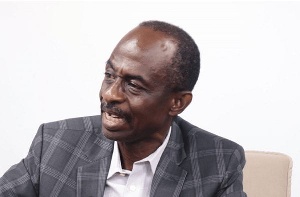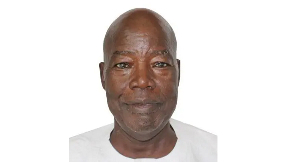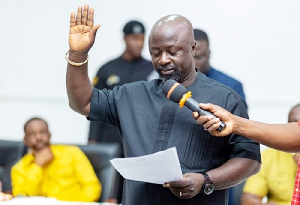The long-term National Development Plan (NDP) for Ghana offers a 40-year perspective, covering the period from the 60th anniversary of the founding of modern Ghana to the centenary of the country. It defines a clear national vision: A just, free and prosperous society.
The current proposed NDP, which is open for discussion with a wide variety of stakeholders, identifies a number of specific goals (there are five in the current draft) and a number of drivers to achieve those goals (there are currently six drivers).
The Director General of the Ghana National Development Planning Commission, Dr Nii Moi Thompson, established in his presentations why a long-term plan is so priceless. He further pointed out that implementing such a plan would ensure national progress and sustainable development that would lead to a meaningful reduction in poverty levels among Ghanaians.
Role of Knowledge Management (KM) in achieving the NDP Vision and Goals
The most effective way to see the linkage between Knowledge Management and the NDP is to examine the NDP Goals and Drivers.
NDP Goals:
Inclusive and resilient economy: KM can contribute by supporting economic growth through the sharing of knowledge across the whole economy; by supporting synergy in the individual and collective efforts of Ghana’s citizens.
Equitable and tolerant society:
The focus on learning as part of the KM approach will facilitate a more equitable and understanding society, supporting tolerance and respect for others.
Safe and Sustainable Communities: At the heart of KM lies the concept of community-based practices. Through group learning and shared understanding, the work of communities will be supported and enhanced.
Effective and efficient institutions: KM supports the development of institutional memory. Institutions advance not just because of today, but through lessons learned over time. It is this focus on lessons from the past which is critical to institutional success.
Contribute to World Peace and Justice: KM thrives in an environment where global learning helps to maximise local effectiveness. Ghana can truly achieve the NDP Vision only when lessons learned at home are shared abroad, and where lessons from afar are applied in Ghana.
NDP Drivers of Transformation
Human capital formation – we need a 21st century labour force. KM can contribute by recognising the powerful synergy which comes from a three-part focus: on people, process and technology. Human capital suggests an understanding of intellectual capital, the key resource for success in the 21st century and beyond.
Land reforms – imperative, especially for infrastructure development. Land reform must be based on a clear understanding of the rights and responsibilities of the stakeholders involved. KM can play its part by facilitating enhanced understanding between opposing forces of reform and providing a common language and discussion platform for reform negotiations to take place.
Public Sector Modernisation - central and local governments. KM and modernisation go hand-in-hand. The very essence of KM is to recognise tacit or implicit knowledge: the importance of personal or individual knowledge in achieving transformation.
Infrastructure Development – Immediate priority: Energy. KM is all about sharing and learning. The NDP will be accelerated by sharing lessons learned with development partners and embedding knowledge for advanced infrastructure development.
Science, technology and innovation – to be competitive/efficient. Knowledge Management is a powerful tool to support innovation. Where the creation and sharing of new ideas is concerned, KM has a proven ability to support innovation in science and technology, at the level of both companies (such as Google) and countries (such as the USA).
Attitudinal change - work ethic; pursuit of excellence; respect for time; attention to detail; respect for law; a sense of urgency. KM is all about people and their role in creating the Vision of the NDP. Where open attitudes to learning, sharing and collaboration are concerned, numerous examples can be found across the globe of organisations that have changed the attitudes of their stakeholders through the deployment of key KM building blocks: people, process and technology.
Summary
Helping Ghanaians access the right knowledge at the right time, KM will put Ghanaian scholars on a higher pedigree. It is important for our day-to-day activities too.
Yet, when the nature of the field of KM is understood properly, suddenly so many of the potential obstacles in Ghana have the ability to melt away. That’s not to claim that the application of KM to the NDP provides a simple cure-all pill. Far from it.
A great deal of work remains to be done. But when the power and synergy of sharing, learning and collaborating are combined with the optimal development of Ghana’s people, processes and technology, the future looks bright indeed. When Dr Thompson chose the “Black Star Rising” message to open his presentation of the Ghana NDP, he did so with a message of hope and determination. KM can contribute to that message.
Ghanaians, let us make best practices our habit and build a knowledge-sharing culture. Don’t lose knowledge repositories such as libraries, archives and museums and improve business drivers at every sector.
• The writer is a Knowledge and Information Management Specialist. writer’s e-mail: randy.kommey37@gmail.com
Opinions of Monday, 26 October 2015
Columnist: Randy Emmanuel Kommey















